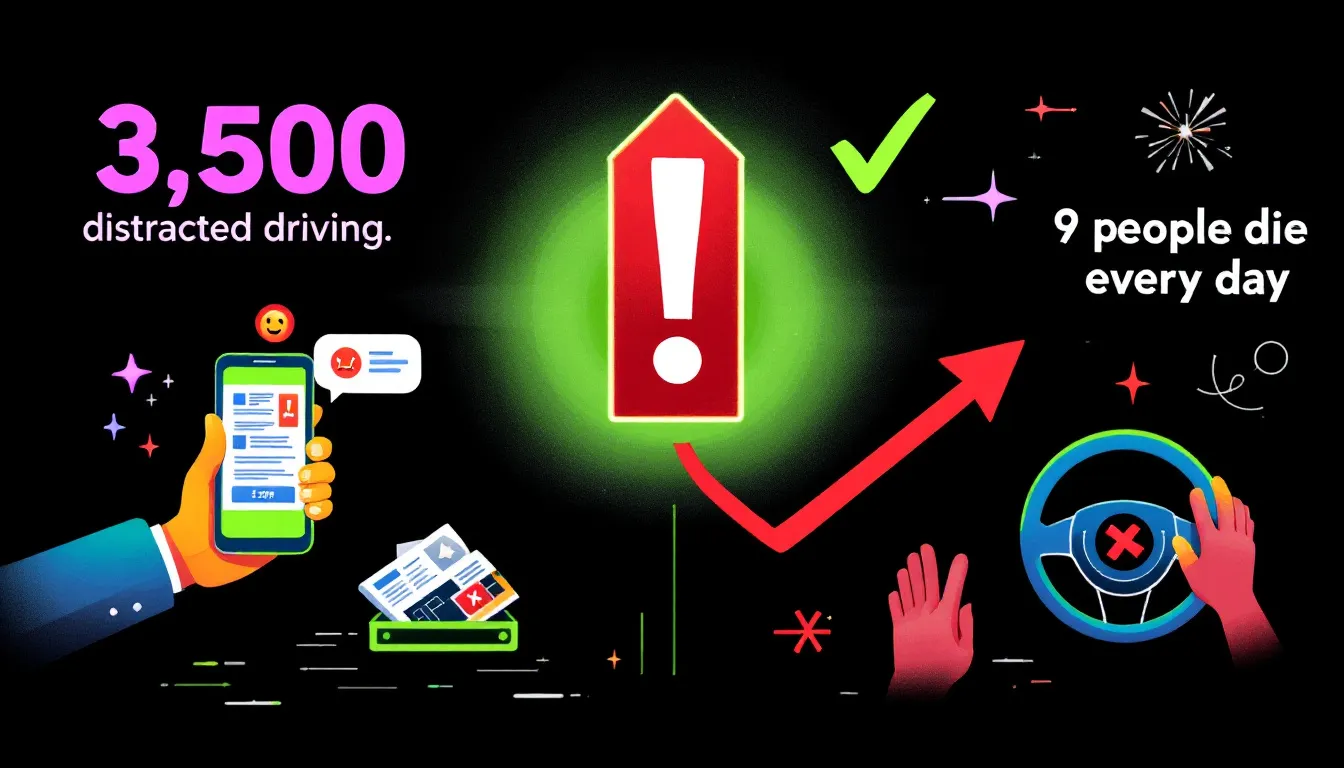Top Tips for Staying Safe During Distracted Driving Awareness Month
April’s Distracted Driving Awareness Month. Month raises awareness about the dangers of driving distractions and promotes safer habits. Started to reduce accidents related to distractions like cell phone use, this campaign covers its origins, dangers, legal consequences, and ways you can contribute to safer roads.
Key Takeaways
- Distracted Driving Awareness Month, established in 2008, aims to reduce accidents caused by distractions like cell phone use while driving.
- Distracted driving is a significant risk, with statistics showing thousands of fatalities each year, highlighting the need for increased focus while driving.
- Legal consequences for distracted driving can include criminal charges and civil liability, emphasizing the importance of avoiding distractions to protect oneself and others.
Understanding Distracted Driving Awareness Month
The inception of Distracted Driving Awareness Month is rooted in a tragic event. In 2008, Shelley Forney’s life changed forever when her daughter fell victim to an incident involving a distracted driver. This devastating loss galvanized Forney into action, laying the foundation for what has become an extensive national effort dedicated to increasing public knowledge about the hazards associated with driving while distracted and encouraging safer driving practices.
Designated as April, Distracted Driving Awareness Month serves to cast a spotlight on the perils of allowing distractions behind the wheel. The goal is straightforward: mitigate road mishaps and curtail traffic-related deaths by informing drivers through this concerted initiative. Throughout April, various entities join forces—ranging from local organizations to federal agencies—to disseminate vital safety messages using tools like public service announcements (PSAs), vibrant social media campaigns, and engaging community activities—all integral elements of promoting national driving awareness.
This annual observance sees varied initiatives designed to educate citizens across different platforms—from scholastic programs targeting young students to wide-reaching digital communications intended for expansive audiences. The National Highway Traffic Safety Administration takes up a pivotal role in these efforts. It’s their mission that ensure widespread dissemination of critical information regarding the risks tied to distracted driving behaviors. Alongside them stands the National Safety Council whose participation fortifies these endeavors aimed at enhancing roadway security for all motorists.
The Dangers of Distracted Driving
The statistics surrounding distracted driving are alarming. In 2018 alone, there were 4,637 fatalities in the U.S. due to incidents involving cell phone use while driving. Fast forward to 2020, and over 3,100 deaths were attributed to distracted driving, with the number rising to 3,308 in 2022. These numbers are more than just statistics; they represent lives lost and families shattered due to preventable accidents.
Using a cell phone while driving is particularly risky. Drivers using handheld devices are three times more likely to be involved in a crash than those who are not distracted. Texting while driving, a common form of distraction, contributes to approximately 400 deaths each year in the U.S. It’s like driving the length of an entire football field with your eyes off the road, a recipe for disaster. The National Highway Traffic Safety Administration highlights that distractions contribute to many accidents, emphasizing the need for increased driving awareness.
However, the dangers of distracted driving go beyond cell phone use. Any activity that takes your focus away from driving, whether it’s eating, adjusting the radio, or talking to passengers, can lead to catastrophic accidents. As drivers, we have a responsibility to ourselves and others to stay focused and avoid distractions. After all, a moment’s distraction can lead to a lifetime of regret.
Legal Consequences of Distracted Driving
Distracted driving can lead to significant legal repercussions. If a driver’s lack of attention causes serious harm or even death, they could be subject to criminal prosecution, facing penalties such as incarceration, probation periods, and substantial fines. For those with prior offenses related to distracted driving, the consequences are typically more severe in various states due to the high risks associated with this behavior.
Victims impacted by accidents caused by distracted drivers have recourse through civil litigation. They may file suits for personal injury in order to recover costs related to medical treatment and mental suffering among other losses incurred. It is imperative for these individuals to seek adept legal counsel who can proficiently steer through the intricacies of the law while assisting victims in comprehending their entitlements and compiling pertinent evidence.
The decision on which firm will represent one’s case should not be taken lightly. Opting for attorneys well-versed in dealing with similar claims is advisable since they often possess a higher probability of success. Prospective clients benefit from complimentary initial consultations offered by numerous firms that permit the exploration of potential courses of action without immediate financial obligation. When an offending motorist lacks sufficient insurance coverage or has none at all, claimants might find it necessary—and possible—to turn towards their own insurers for reparation under certain conditions—highlighting yet another reason why undivided focus behind the wheel remains critical in preventing dire distractions whilst operating vehicles.
Proving Negligence in Distracted Driving Cases
Establishing fault due to negligent behavior is critical in distracted driving cases for a claim to be successful. It’s necessary to show that the driver was not paying attention while operating their vehicle without good reason. Collecting key evidence, such as accounts from witnesses, records of cell phone usage, and official reports from the accident scene, is vital for substantiating this point.
Nevertheless, there can be circumstances under which a driver’s lack of attention may be deemed excusable. An example would be if the distraction occurred as a response to an urgent situation concerning a passenger in the car. This could exonerate the driver from charges of carelessness.
Comprehending these subtle details is crucial for all parties implicated in incidents involving distracted driving, whether they are claiming injury or defending themselves against accusations.
Common Forms of Distracted Driving

Distracted driving comes in many forms, all of which can be equally dangerous. Texting while driving is one of the leading causes of severe accidents. Using social media while driving is similarly risky, diverting attention away from the road and increasing the likelihood of a crash.
Before:
But distractions are not limited to phone use. Eating and drinking while driving can also divert a driver’s attention, leading to dangerous situations. Adjusting a GPS or the radio, though seemingly harmless, can also be a significant distraction. These activities take your eyes off the road and your hands off the wheel, compromising your ability to react to sudden changes in traffic conditions.
After:
Distractions while driving can come from various sources, including:
- Phone use
- Eating and drinking
- Adjusting a GPS
- Changing the radio
These activities take your eyes off the road and your hands off the wheel, compromising your ability to react to sudden changes in traffic conditions.
Engaging in conversation with passengers is another common form of distraction. While it’s natural to talk to those in the car, it’s important to remember that driving requires full attention. Even a momentary lapse in focus can have dire consequences. Recognizing these common distractions is the first step in promoting safer driving habits.
Raising Awareness and Promoting Safe Habits
Fostering awareness about the perils of distracted driving is a shared responsibility. Throughout the year, the Governor’s Traffic Safety Committee (GTSC) plans and executes events aimed at spreading knowledge regarding the hazards associated with driving while distracted. This involves disseminating informational pamphlets during key public gatherings as well as through community outreach programs.
Utilizing public service announcements (PSAs) is pivotal in communicating information on how dangerous it can be to drive when distracted. The GTSC employs diverse channels such as billboards, social media posts, and variable message signs (VMS) to effectively communicate this message to an extensive audience base. Campaigns like ‘Put the Phone Away or Pay’ inspire law enforcement bodies to tackle incidents of distracted driving with greater vigor.
Contributing personally to enhancing road safety is also crucial. Establishing safe routines like activating your phone’s ‘Do Not Disturb’ function whilst you are behind the wheel, nominating a fellow passenger to handle texting duties – thus becoming a ‘designated texter’, and adjusting all necessary vehicle settings prior to embarking on your journey are measures that greatly reduce distraction risks.
Parents alongside their teenage children play an integral part in advancing safe driving practices. By leading by example with cautious driving behaviors and discussing these dangers candidly with their teenagers, parents set essential standards for responsible conduct on roads. Teenagers equally have influence, especially via platforms such as social media, which they can harness not only for broadcasting messages endorsing prudent motoring habits but also serve as reminders among themselves highlighting concentration’s significance once at the steering wheel — collective actions that undeniably contribute toward preserving life continuity while enhancing overall vehicular security.
How to Protect Yourself from Distracted Drivers
Begin with a commitment to attentive driving by ensuring you dedicate your full focus to the act of driving. Make all necessary adjustments, like positioning seats and mirrors, before initiating your journey so that you won’t be sidetracked while in motion.
Ensure that all items within the vehicle are secured properly. This will help diminish the urge to reach for them when on the road. Confirm that children and pets are safely restrained before setting off to prevent potential distractions during transit.
Should there arise a need to handle tasks such as responding to your cell phone or tending to a child’s needs, always find a safe spot where you can park first. Storing your phone out of hands’ reach or switching it off while behind the wheel greatly aids in avoiding its allure.
Adhering strictly to these measures significantly enhances safety against hazards associated with distracted drivers, both for oneself and fellow road users.
Resources for Victims of Distracted Driving Accidents
Should you find yourself a victim in an incident precipitated by a driver preoccupied while behind the wheel, it is vital to seek legal assistance. Obtaining a lawyer can be instrumental in guiding you through the intricacies of filing claims and grasping your entitled protections. Contacting 1-800-THE-LAW2 can help you access a free consultation with an experienced attorney — that way, you’ll have a better understanding of how to litigate after being injured in a distracted driving episode.
Individuals impacted by accidents resulting from driving distraction may have eligibility for substantial recompense covering health care costs, and psychological suffering, among other financial impacts incurred. Being informed about your entitlements and accessible support systems could greatly influence the outcome of your post-accident recuperation journey.
Summary
Distracted Driving Awareness Month serves as a powerful reminder of the importance of staying focused on the road. From understanding the origins of this awareness campaign to recognizing the various forms of distraction and their dangers, we’ve covered essential information that can help make our roads safer.
By raising awareness, promoting safe driving habits, and providing resources for victims, we can collectively work towards reducing the number of accidents caused by distracted driving. Remember, every small effort counts, and together we can save lives.
Frequently Asked Questions
April marks Distracted Driving Awareness Month, which is dedicated to raising awareness about the dangers of driving while distracted and promoting safer driving practices.
This serves as an important prompt for drivers everywhere to keep their attention on the road at all times.
Common forms of distracted driving include texting, using social media, eating and drinking, adjusting the GPS or radio, and engaging with passengers.
It is crucial to minimize these distractions to ensure road safety.
Distracted driving can lead to serious legal consequences, including criminal charges, fines, jail time, and civil liabilities for damages resulting from an accident.
It is crucial to understand these risks to ensure safety on the road.
To protect yourself from distracted drivers, stay fully attentive and minimize distractions by securing loose items and adjusting settings before you start driving.
Keep your cell phone out of reach or turned off to maintain focus on the road.
Individuals affected by distracted driving incidents have the opportunity to utilize services such as 1-800-THE-LAW2, which offers complimentary legal advice and can help secure reimbursement for healthcare costs and other damages incurred.
Promptly acquiring legal support is essential in order to comprehend your entitlements and available choices.




